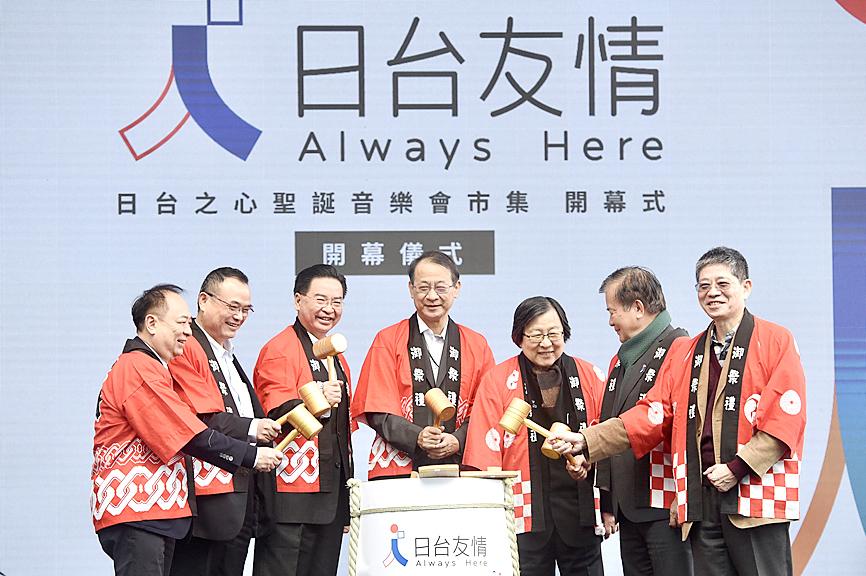This year has been “the year of Taiwan,” as more countries have stood up to support the free and democratic nation, Japan-Taiwan Exchange Association Representative Hiroyasu Izumi said yesterday.
Izumi made the remarks at a Christmas fair outside the Taipei 101 building, which was part of a series of events to mark Taiwan-Japan friendship.
Izumi said that on Jan. 23, he saw the slogan “Japan-Taiwan friendship” in Chinese displayed on Taipei 101, lighting up bilateral relations.

Photo: George Tsorng, Taipei Times
In March, the Japan-Taiwan Exchange Association and the Ministry of Culture cohosted an exhibition marking the 10th anniversary of the 2011 Great East Japan Earthquake, demonstrating their robust bonds, he said.
When the first batch of COVID-19 vaccines donated by Japan arrived in Taiwan, Izumi was grateful that Japan could finally use its own means to help Taiwan in return for Taiwan’s aid following the 2011 earthquake, he said.
When Japan was facing its most severe outbreaks of the pandemic, Taiwan donated medical equipment to assist the country’s medical personnel, he added.
During the Summer Olympics in Tokyo, Japanese and Taiwanese athletes were able to cheer for each other’s teams, transcending the divide between competitors, he said.
Many Japanese have been discussing on social media why they cannot have Taiwanese pineapples in the winter, which shows that bilateral relations are propped up by people, he said.
“The world will remember Japan and Taiwan in 2021,” Izumi said.
It is not only Taiwan-Japan ties are warming, he said, adding that more support for a free and democratic Taiwan can be heard across the world.
As Japan’s envoy to Taiwan, Izumi said he feels proud to see Taiwan securing more friends.
Next year marks the 50th anniversary of the Japan-Taiwan Exchange Association’s establishment, he said.
Formerly known as the Interchange Association, Japan, the de facto embassy was renamed in 2017.
In the next 50 years, Japan and Taiwan are sure to continue being friendly neighbors, he added.
Asked about Taiwan’s ban on food imports from five Japanese prefectures following the 2011 Fukushima Dai-ichi nuclear power plant disaster, Izumi said the ban is irrelevant to Taiwan’s application to join the Comprehensive and Progressive Agreement for the Trans-Pacific Partnership.
Nevertheless, he said that farmers in Fukushima Prefecture are working hard on food safety.
Taiwan is responsible for its own food safety issues, while Japan adheres to international and scientific standards, he added.
Taiwan and Japan are discussing the matter, and Japan is waiting to see if Taiwan removes the ban, Izumi said.

Taiwan has received more than US$70 million in royalties as of the end of last year from developing the F-16V jet as countries worldwide purchase or upgrade to this popular model, government and military officials said on Saturday. Taiwan funded the development of the F-16V jet and ended up the sole investor as other countries withdrew from the program. Now the F-16V is increasingly popular and countries must pay Taiwan a percentage in royalties when they purchase new F-16V aircraft or upgrade older F-16 models. The next five years are expected to be the peak for these royalties, with Taiwan potentially earning

STAY IN YOUR LANE: As the US and Israel attack Iran, the ministry has warned China not to overstep by including Taiwanese citizens in its evacuation orders The Ministry of Foreign Affairs (MOFA) yesterday rebuked a statement by China’s embassy in Israel that it would evacuate Taiwanese holders of Chinese travel documents from Israel amid the latter’s escalating conflict with Iran. Tensions have risen across the Middle East in the wake of US and Israeli airstrikes on Iran beginning Saturday. China subsequently issued an evacuation notice for its citizens. In a news release, the Chinese embassy in Israel said holders of “Taiwan compatriot permits (台胞證)” issued to Taiwanese nationals by Chinese authorities for travel to China — could register for evacuation to Egypt. In Taipei, the ministry yesterday said Taiwan

‘LIKE-MINDED PARTNER’: Tako van Popta said it would be inappropriate to delay signing the deal with Taiwan because of China, adding he would promote the issue Canadian senators have stressed Taiwan’s importance for international trade and expressed enthusiasm for ensuring the Taiwan-Canada trade cooperation framework agreement is implemented this year. Representative to Canada Harry Tseng (曾厚仁) in an interview with the Central News Agency (CNA) said he was increasingly uneasy about Ottawa’s delays in signing the agreement, especially as Ottawa has warmed toward Beijing. There are “no negotiations left. Not only [is it] initialed, we have three versions of the text ready: English, French and Mandarin,” Tseng said. “That tells you how close we are to the final signature.” Tseng said that he hoped Canadian Prime Minister Mark Carney

POSITIVE DEVELOPMENT: Japan and the US are expected to hold in-depth discussions on Taiwan-related issues during the meeting next month, Japanese sources said The holding of a Japan-US leaders’ meeting ahead of US President Donald Trump’s visit to China is positive news for Taiwan, former Japan-Taiwan Exchange Association representative Hiroyasu Izumi said yesterday. After the Liberal Democratic Party’s landslide victory in Japan’s House of Representatives election, Japanese Prime Minister Sanae Takaichi is scheduled to visit the US next month, where she is to meet with Trump ahead of the US president’s planned visit to China from March 31 to April 2 for a meeting with Chinese President Xi Jinping (習近平). Japan and the US are expected to hold in-depth discussions on Taiwan-related issues during the